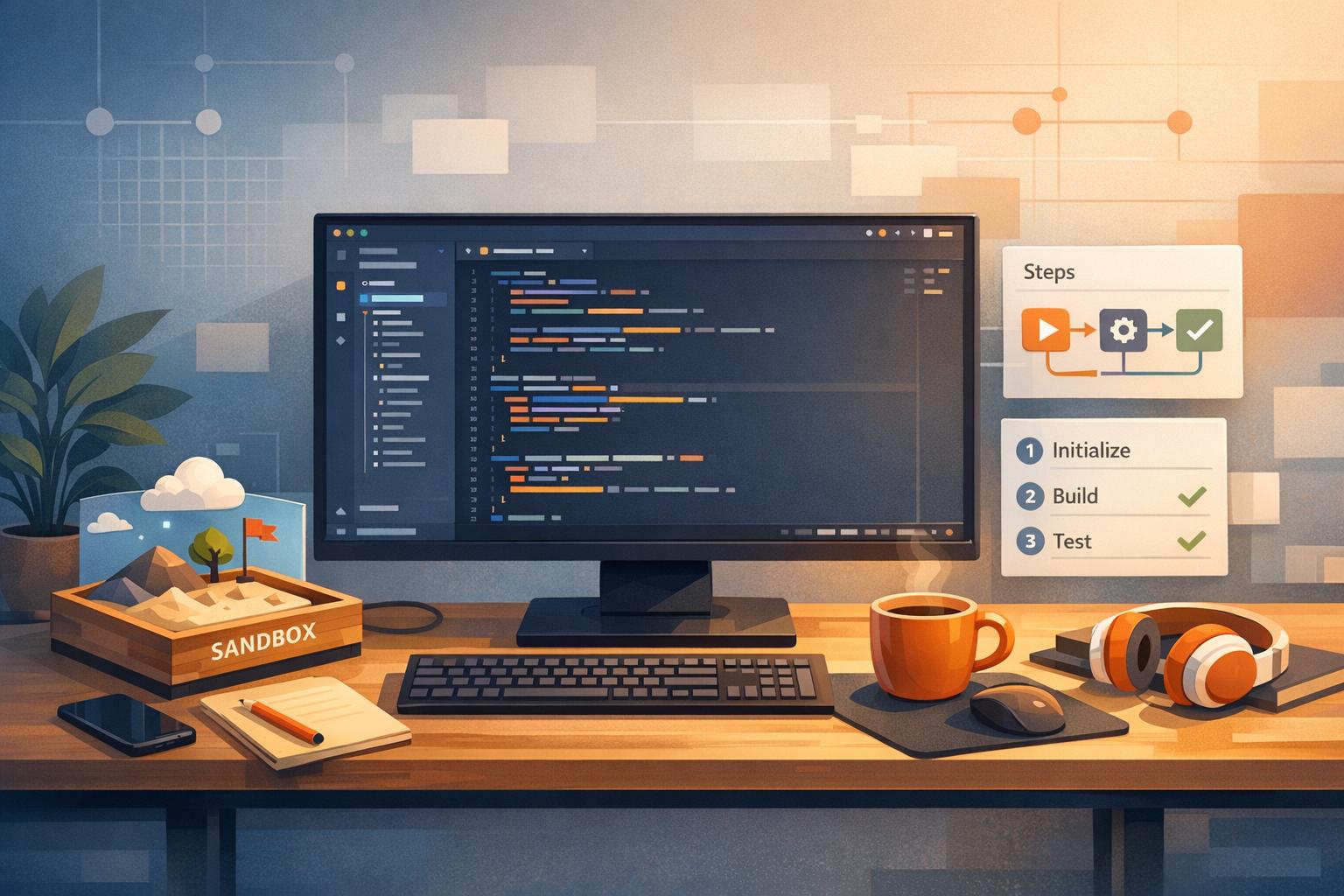


Learn how to effectively advertise developer events by avoiding common pitfalls and utilizing targeted strategies for better engagement.
Struggling to get developers to attend your events? Advertising to developers is tricky because traditional marketing doesn’t work. Developers want ads that are clear, relevant, and fit within their daily habits. Here’s a quick look at the biggest mistakes and how to fix them:
- Generic messaging: Ads using vague buzzwords don’t grab attention. Be specific about tools, technologies, and benefits.
- Wrong platforms: Ads placed where developers don’t engage waste money. Use trusted platforms developers already visit.
- Poor tracking: Metrics like clicks aren’t enough. Focus on registrations, attendance, and post-event impact.
- Annoying formats: Pop-ups and disruptive ads drive developers away. Use ads that blend into their content.
- Small budgets: Limited funds reduce reach and testing options. Plan budgets to include testing and premium placements.
Fixes:
- Target specific developer groups by tools, languages, or experience.
- Use in-feed ads on developer-focused platforms like daily.dev.
- Track meaningful metrics like registrations and attendee feedback.
- Test different ad formats to see what works best.
- Allocate realistic budgets for creative ads and performance tracking.
Want your event ads to stand out? Focus on clarity, relevance, and trust to connect with developers effectively.
5 Main Problems with Developer Event Ads
Generic or Unfocused Messages
Ads with vague or generic messages fail to grab the attention of technical audiences. Developers tend to ignore ads packed with buzzwords like "cutting-edge technology" or "innovative solutions" if they lack specific details. They want to see real examples - specific technologies, frameworks, or methodologies that are relevant to their work.
Wrong Ad Placement
Placing ads on platforms with low engagement is a waste of resources and can hurt credibility. Ads perform better when they appear in spaces where developers are already exploring and learning about new technologies. For example, native in-feed ads on technical platforms are often more effective because they fit naturally into the content developers are consuming.
Basic Performance Tracking
Relying on simple metrics like clicks and impressions doesn't tell the full story. Important data points often overlooked include:
- How many people actually attend the event
- Levels of engagement during the event
- Whether attendees apply what they learned afterward
- The long-term value of attendees to the brand
Disruptive Ad Formats
Ads that interrupt or annoy - like pop-ups, auto-playing videos, or ads that disrupt content - tend to drive developers away. Developers prefer uninterrupted learning experiences, so ads that integrate smoothly into their environment are much better received.
Small Marketing Budgets
Limited budgets can severely impact campaign effectiveness. They reduce reach, make it harder to maintain a consistent presence, and limit the ability to test different ad formats or optimize campaigns. This is especially challenging when targeting developers in niche technical fields.
Strategies to tackle these issues are essential for improving ad performance and engagement.
Best practices of technical marketing for dev tools. Dev ...
sbb-itb-e54ba74
How to Fix Developer Event Ad Problems
Addressing challenges with developer event ads requires focused, data-driven strategies designed specifically for this audience.
Focus on Specific Developer Groups
Promote your events by targeting the right developers. For instance, if you're hosting a cloud computing workshop, aim for developers who use tools like Docker or Kubernetes.
Create detailed developer personas based on factors like programming languages (e.g., JavaScript, Python, Java), experience levels (from junior to senior), and the tools they use.
Use In-Feed Ad Placement
In-feed native ads can be highly effective for promoting developer events. These ads fit naturally within the content developers already engage with, making them less intrusive and more appealing. Platforms like Daily.dev Ads offer in-feed options that integrate smoothly with trusted developer-focused content.
Make sure your ad aligns with the surrounding content, includes valuable technical insights, and clearly communicates the event's purpose.
Measure Real Event Impact
Go beyond surface-level metrics to evaluate the true success of your ads. Track key performance indicators at every stage:
- Before the event: Registration numbers
- During the event: Actual attendance
- After the event: Feedback from participants
These metrics give you a clearer picture of how well your ads are performing.
Test Different Ad Formats
Try out various ad formats to see what works best for your audience. Start with small-scale tests and expand on what performs well.
Experiment with elements like ad copy (balancing technical details with clear benefits), visuals (code snippets versus diagrams), call-to-action placement, and timing.
Plan a Realistic Ad Budget
Allocate a budget that accounts for creative development, premium in-feed ad placements, and performance tracking. Make sure to leave room for testing and refining your approach.
Tips for Better Developer Event Ads
Understand Your Developer Audience
Break down your audience into specific groups to tailor your messaging:
- Technical expertise and tools: Think programming languages, frameworks, and development environments.
- Experience level: Address junior developers, mid-level professionals, or senior engineers differently.
- Industry focus: Cater to developers specializing in particular domains or niches.
Highlight Event Benefits Clearly
Once you’ve pinpointed your audience, focus on what your event offers them. Developers want straightforward, actionable benefits:
- Learning opportunities: Specify the skills, certifications, or knowledge they’ll walk away with.
- Networking potential: Mention who they’ll connect with - industry leaders, peers, or tech experts.
- Career growth: Show how attending the event ties into their professional development.
- Technical depth: Call out the specific tools, technologies, or frameworks you’ll cover.
Make sure your benefits are concrete and easy to understand.
Advertise Where Developers Are
Target platforms where developers already spend their time. This ensures your ads feel natural and relevant. For example, daily.dev Ads allow for precise targeting, helping you connect with developers based on their interests and expertise.
"daily.dev is different from anything you've tried in the past as no other developer platform offers the same level of visibility, intent, and trust." - daily.dev for Business
Track and Refine Campaigns
Once your ads are live, don’t stop there. Use performance data to fine-tune your approach. Pay attention to metrics like:
- Click-through rates segmented by audience type.
- Registration conversions to measure success.
- Cost per registration to gauge campaign efficiency.
- Engagement patterns to adjust timing or messaging.
These insights will help you improve targeting, refine your message, and optimize ad placement for better results.
Conclusion
Summing up the strategies discussed, effective advertising for developer events hinges on accurate audience targeting, intuitive native ad formats, and thorough performance tracking.
daily.dev Ads stands out by offering precise targeting and access to a global developer audience. This approach blends strategic ad placement with data-driven insights, helping advertisers achieve measurable results.
The core of solving developer event advertising challenges lies in three key principles: targeting the right audience, tracking performance beyond surface-level metrics, and fine-tuning campaigns using platforms tailored for developers. When applied effectively, these principles lead to more impactful and engaging event promotions.
Developer-focused platforms bring unique benefits, including specialized tools and direct access to trusted technical communities. By consistently applying these strategies and focusing on meaningful outcomes, businesses can enhance their success in promoting developer events.






